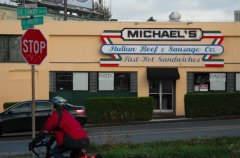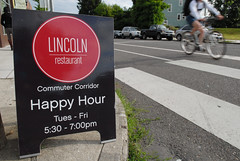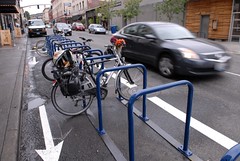Despite the many strides bicycles have made in cities across America, one criticism they haven’t been able to completely shake is that they’re bad for business. And, in an economic climate like we’re in today, that’s a serious accusation.
As long as cities have been planning for bicycle traffic, business owners have complained that bike lanes, bike parking, and other bike-related facilities hurt their business. The thinking goes like this: Car access equals business success. Do anything to decrease that access — like remove car parking, narrow or remove car lanes for bikeways, or install traffic calming measures like medians or speed bumps — and the result is less business.
However, there are recent academic and real life examples that seem to prove that bike access is good for business.
A study based in Toronto and published by the Clean Air Partnership in February found that the removal of car parking and installation of a bike lane did not negatively impact merchants. The executive summary of that study stated:
“The spending habits of cyclists and pedestrians, their relatively high travel mode share, and the minimal impact on parking all demonstrate that merchants in this area are unlikely to be negatively affected by reallocating on‐street parking space to a bike lane. On the contrary, this change will likely increase commercial activity.”
Another sign that improved bike access can be good for business is the overwhelming demand the City has received for on-street bike parking. Scores of business owners are eager for the City to remove car parking spaces (which would have been unheard of just a few years ago) to install an on-street bike corral which can fit 14-20 bicycles in the same space.
But, despite these examples, the thinking that “bikes are bad for business” persists.
When the City of Portland released the Public Comment Draft of the Portland Bicycle Plan for 2030 last week, it sparked one local TV station to highlight those concerns.
In their story, Businesses fear city bike plan might drive people away, KATU interviewed downtown business owners who have concerns that the City’s plans would hurt their business.
One business owner told KATU that “I like that it’s a bike-friendly city, but I also want it to be a city that’s friendly for businesses as well”. Another business owner said the bike plan “reaffirms their decision” to move out of downtown because their customers have been complaining about a “lack of parking, gridlock, and construction”.
These concerns are not new. A quick look at archives of The Oregonian from when the City released their previous bike master plan in 1996 turns up similar fears.

One public relations hurdle for the City’s bike program back in 1996 was caused by a man named Michael Zokoych, owner of Michael’s Italian Beef & Sausage Co. Zokoych was vehemently opposed to the bike program’s proposal to stripe a bike lane in front of his deli on SE Sandy Boulevard between Ankeny and Burnside.
Here’s a snip featuring a quote from Zokoych from an article published in The Oregonian on January 8th, 1996:
“The people on the bike program here have been fanatical about throwing bike lanes down based on greed instead of statistical analysis,” he said. “They’ve been slapping down bike lanes on a street without any analysis of whether the street needs a bike lane.”
He also questioned whether the city was paying too much attention to the concerns of cyclists and not enough to the needs of businesses on the east side.
The City worked with Zokoych and helped him organize a town hall meeting to discuss the issue. In the end, the bike lane was installed.
Mia Birk was bike program manager back in 1996 and she’s now Co-Chair of the Master Plan’s Steering Committee. I asked her if any of the business community’s fears back then came to fruition.
“None of the fears from the 1996 plan were realized. Every single place we’ve put in bike lanes, the businesses have not been hurt. In fact, they’ve helped with a lot of other problems and have helped create safer streets.*”
(Birk is likely thinking of recent statistical analysis by PBOT showing that as bike ridership has increased, the roads have become safer for all users, not just people on bicycles.)
But that’s not the picture Zokoych paints. I spoke with him on the phone yesterday to ask him about his stance on the City’s bike plans in 1996 and whether or not he still felt the same way. He does.
Have your fears about the bike lane been realized? “Yes they have been realized,” he replied, “They are severely interrupting traffic, causing major havoc for drivers, exacerbating belligerence between bicyclists and car drivers.”
Zokoych thinks the City’s focus on increasing bike use is contributing to animosity between bikes and cars.
“The bicyclists have been empowered by a general drift from the city to embrace a very empowering type of belligerence that is rude to car drivers and pedestrians both. They also don’t ride properly on the bike lanes… it’s created a pretty dangerous situation.”
When I asked Zokoych if, given his feelings about people who ride bikes, whether he feels that encouraging bicycle riding is a good thing for our city he said “Yes. But how they implement it is another story.” Zokoych favors completely separate facilities and streets for bikes, instead of “co-mingling bikes and cars” which he feels only creates “animosity between groups of people”.
Zokoych added that he has “very, very few” customers who arrive by bike. When asked if he had any bike parking, Zokoych said no. “The City wanted to put the racks right in front of my door, but I didn’t want them there. I said, ‘we have a place about 40 feet away that works much better’, but they refused, so now I have none.”
Birk, who parlayed her work in building Portland’s bike network in the ’90s into a successful career as a planning consultant, said she thinks some business owners will just always be afraid of change. “It’s just fear of the unknown. We understand that it is challenging for a business owner when things change, but the things we’re proposing have been proven to be successful, not just in the city of Portland but all over the world. That’s what we’re basing this plan on.”
As we transition from a car-centric city to a city that prioritizes active transportation, there will be some growing pains. Businesses thrive on pleasant and comfortable streets, where people have enough space to linger and enjoy stores in a comfortable and relaxing environment (see The Grove in Los Angeles). But, as long as there are business owners who don’t have a large number of customers who arrive by bike, concerns will remain.



